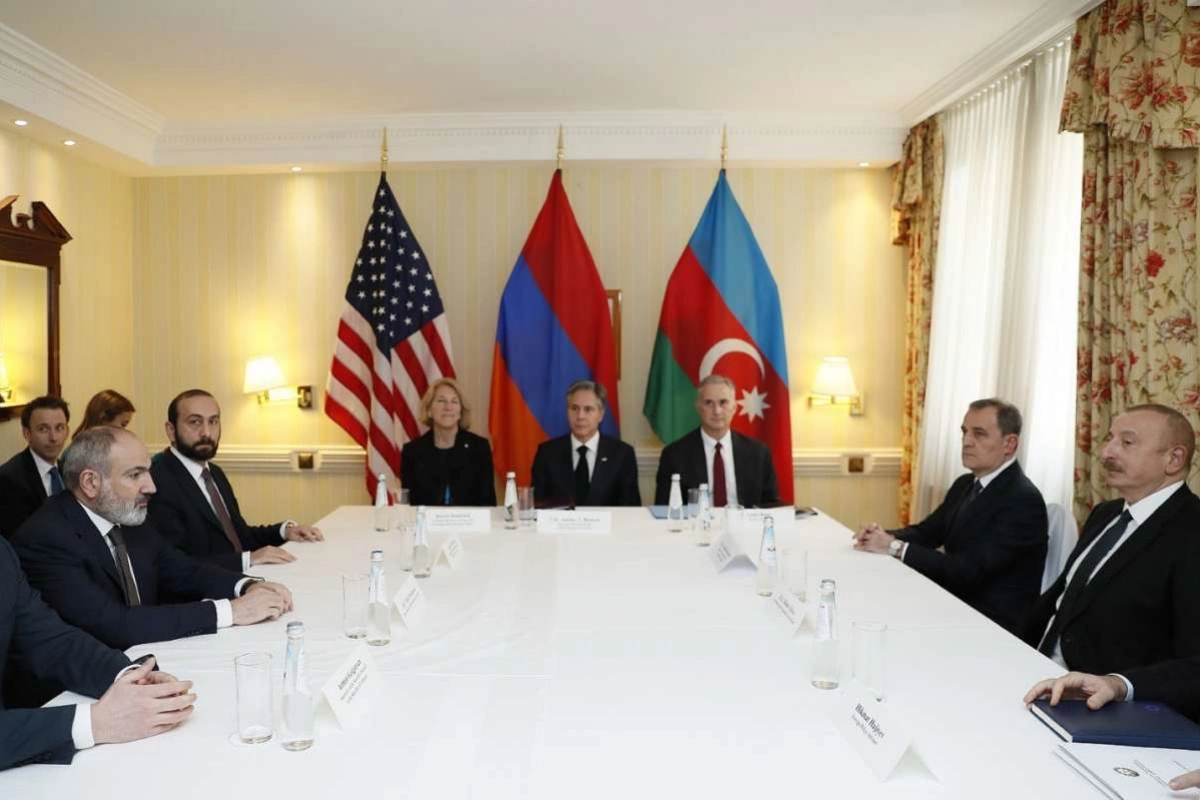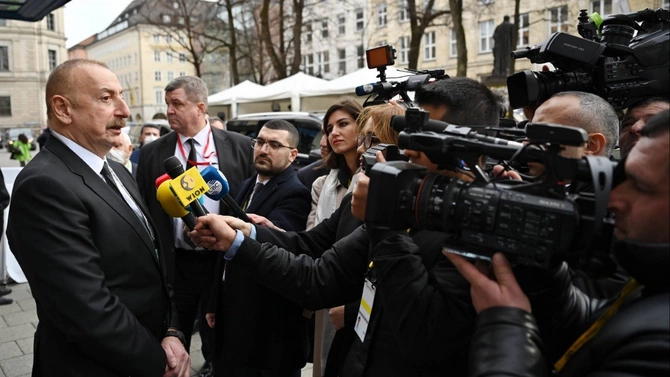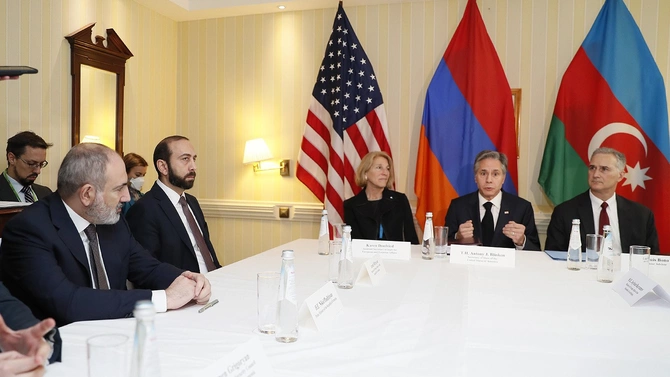
Happening now: The high-level talks between Azerbaijan and Armenia are currently underway in Munich, Germany, with the mediation of the US Secretary of State Blinken.
Image: primeminister.am
On February 18, U.S. Secretary of State Antony Blinken made a significant move towards resolving the long-standing dispute between Armenia and Azerbaijan on Saturday by bringing together Armenian Prime Minister Nikol Pashinyan and Azerbaijani President Ilham Aliyev. The trilateral meeting, held on the sidelines of the Munich Security Conference, was attended by key officials from both sides currently involved in attempts to resolve the conflict.
It was also the first meeting of the Armenian and Azerbaijani leaders since a summit convened by Russian President Vladimir Putin in Sochi at the end of October 2022. Flanked by Assistant Secretary of State for European and Eurasian Affairs Karen Donfried and newly appointed Senior Advisor for Caucasus Negotiations Louis L. Bono, Blinken was hopeful that a long-awaited peace agreement was possible.
“We believe that Armenia and Azerbaijan have a genuinely historic opportunity to secure enduring peace after more than 30 years of conflict,” the U.S. Secretary of State said in a brief opening address to media. The remainder of the meeting took place behind closed doors.
In a surprise development, Aliyev and Pashinyan joined Organisation for Security and Cooperation in Europe (OSCE) Secretary General Helga Maria Schmid and Georgian Prime Minister Irakli Garibashvili in a panel moderated by Munich Security Conference Chair Christoph Heusgen. It had been previously advertised without the participation of the Armenian Prime Minister.
Though acrimonious at times, the panel was historic as it included the Armenian, Azerbaijani, and Georgian leaders sharing a platform for the first time since independence. It also offered a glimpse into what else was discussed during the trilateral meeting with Blinken. Some information was also detailed in remarks made to the media by Aliyev and a brief statement issued by Pashinyan’s press office.
“The course of the works around a peace treaty draft between Armenia and Azerbaijan was discussed at the meeting, as well as the unblocking of regional transport infrastructures and delimitation between the two countries in accordance with the agreement reached in Prague,” read the Armenian statement. “Prime Minister Pashinyan reiterated Armenia’s commitment to achieve the signing of a peace treaty that would truly guarantee lasting peace and stability in the region.”
“Three days ago, we received new responses to our proposals from Armenia,” Aliyev said. “We are elaborating them now. At first glance, there is progress in Armenia’s position, but it is not sufficient.”

The continuing impasse on the Lachin Road featured during the meeting. Aliyev also announced that Baku had now proposed that Yerevan install its own checkpoints on transportation routes from Azerbaijan via Armenia to the exclave of Nakhichevan in exchange for the same on the Lachin highway connecting Armenia to Karabakh.
“Today, at the meeting […] I officially put forward this as a proposal. We will wait for a response from Armenia,” he announced.
Unobstructed access to Nakhichevan, more commonly referred to in Azerbaijan as the Zangezur Corridor, is a stipulation of the November 2020 trilateral ceasefire statement but remains unfulfilled. Some analysts believe that disagreement over the modalities of the route lies at the centre of events unfolding over the Lachin Road. In layman’s terms, both routes should be reciprocal in nature. If there are no customs and border controls on one, as with Lachin, there should be none on the other.
Armenia appears to reject this option, however, leading to making public this new proposal by Azerbaijan to have border checks on both. “Previously, this suggestion was communicated through unofficial channels,” Aliyev said. “Armenia did not voice any position. They probably need some time to discuss it. But our initial impression is that both Europe and America view this proposal of ours as logical.”
Unfortunately, and though it could have been avoided, disagreement over the Lachin Road also materialized during the panel discussion, “Moving Mountains: Building Security in the South Caucasus,” held just hours later. To begin with, it did at least appear to offer some initial hope for a constructive discussion on regional security.
“[…] we know what is war. We know what kind of devastation and suffering it brings to the peoples,” Aliyev said in his opening remarks. “Therefore, we, of course, want peace to be established in Eurasia. And I think that Azerbaijan and Armenia need to demonstrate that the transition from the long-lasting stand of mutual hatred and hostility must end.”
“We are now working on a peace agreement between Armenia and Azerbaijan,” he continued. “Hopefully, we [will] conclude it sooner or later. And I think that could be a good example how countries which had serious historical disagreements can get together and turn the page of hostility.”
Pashinyan also started with remarks that could be loosely considered conciliatory.

"I also would like to express my gratitude to you for organizing such a format,” he remarked to the moderator. “And, really, I agree maybe it is a historic meeting. But, it's very important to identify the content of the history that now is being created. Because we can have different outcome[s], consequences or results, and I think we need to be result-oriented. And that is our approach.”
Moderator Heusgen then pitted the two against each other by raising the issue of the standoff on the Lachin Road. In response, however, Aliyev revealed other details of the proposed peace agreement discussed with Blinken earlier in the day.
“As far as we understand in our communications with our American partners and partners from European Union, and also, as far as I understood from today’s trilateral meeting with Prime Minister Pashinyan, which was organized by Secretary Blinken, we have a common understanding that there should be a two-track approach to the situation in the region,” he said. “First, [the] Azerbaijan-Armenia peace talks track. Second, Azerbaijan’s communications with the Armenian population in Karabakh,” Aliyev added, though also again repeating that Baku will not negotiate with Ruben Vardanyan, the Russian-Armenian businessman now serving as the breakaway region’s unelected but de facto State Minister and even though he has lived there for less than six months.
Aliyev nonetheless reaffirmed his support for the peace process.
“We have several platforms to address the issues related to normalization of [the] Azerbaijani-Armenian relationship,” he noted towards the end of the panel. "One of them is the so-called Brussels format. And yesterday, during the meeting with the President of the European Council, Mr. Charles Michel, we once again reconfirmed our commitment to the Brussels process.”
Though it came as part of an acrimonious exchange with his Azerbaijani counterpart, the Armenian Prime Minister also reiterated his belief in what has become locally known as the ‘peace agenda’ in Armenia.
“We have a very complicated history,” he said, before also highlighting the unprecedented nature of the panel. “Yes, maybe it is a historical meeting, but for what purpose do we want to use this? For inflaming intolerance, hate, aggressive rhetoric in our region? Or the opposite, do we want to use this platform for making things better? We think that this platform should be used for constructive purposes.”
With many disappointed by the panel and Reuters even reporting that both Aliyev and Pashinyan highlighted "their disparate positions” and offered “scant evidence that lasting peace was on the cards,” U.S. Secretary of State Blinken nonetheless seemed satisfied with the meeting he had held earlier in the day.
“Pleased to hear that the Armenia-Azerbaijan peace process is on track and negotiations between the two sides are continuing,” he tweeted.
Share on social media